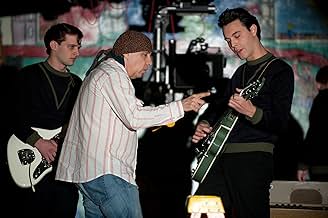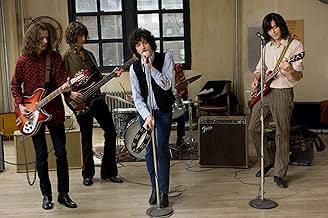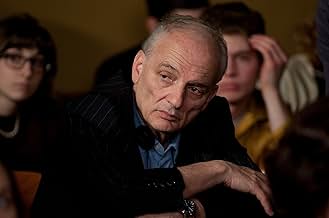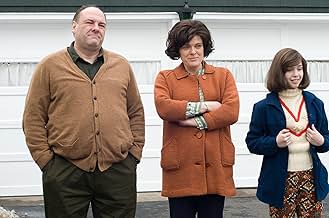IMDb-BEWERTUNG
6,0/10
5062
IHRE BEWERTUNG
Rock 'n' Roll Coming-of-Age-Story über eine Gruppe von Vorstadt-Teens in einer 60er-Jahre Rockband.Rock 'n' Roll Coming-of-Age-Story über eine Gruppe von Vorstadt-Teens in einer 60er-Jahre Rockband.Rock 'n' Roll Coming-of-Age-Story über eine Gruppe von Vorstadt-Teens in einer 60er-Jahre Rockband.
- Auszeichnungen
- 3 Gewinne & 3 Nominierungen insgesamt
Christopher Bannow
- Dave Smith
- (as Chris Bannow)
Empfohlene Bewertungen
David Chase's "Not Fade Away" looks at what it was like to come of age in the '60s. The main focus is a New Jersey teenager who decides to join a band, but there are clear signs of everything that was going on: the Vietnam War, the generation gap, racial tensions, and Dean Martin's mean-spirited comment about the Beatles. Contrary to the previous reviewer, I would say that this movie is better than "Almost Famous". The latter was too fluffy and came across as a sanitized look at its era. This one is very upfront about what sorts of things happened (including some very tense scenes). And the final line poses a good question about how we as Americans want to be known to the world. Can we eventually look to our best qualities to do what's right?
Anyway, this is a good movie. It's got great music and brings up some important points. I recommend it.
Anyway, this is a good movie. It's got great music and brings up some important points. I recommend it.
just finished up watching this growing up in the sixties, and rock and roll movie. for the earliest of the Baby Boomers, this is the movie for you, and the music will rock your soul. A teenage band, with inspirations maybe a little too optimistic. With a top notch cast, and great story telling, this was indeed entertaining and very realistic, since I was in a little band back then too. James Gandolfini is great as a pretty typical sixties Father, coping with everyday problems and a pretty wacky Wife. The teenagers are very realistic, and you could tell it was written pretty much biographical. It works for me. Highly recommended especially to us Boomers.
David Chase's Not Fade Away is an exercise in nostalgia in a competent order, meaning that those who enjoy or, above all, relate to the events in the film will appreciate it the most. I'm stuck in the position where I often find my self; on the corner of admiration and disappointment.
Stylistically, David Chase (TV's The Soprano's) and cinematographer Eigil Bryld (Netflix's own TV series House of Cards) couldn't have made a more bleeding-gums representation of the 1960's if they tried. It looks marvelous in all its polished, minimalist glory. Thematically and applicably, there should've been so much more of a story to tell about a garage band that never made it despite determination to "not fade away." For this reason, the film can be viewed as one where talents embrace culture, chew scenery, and nothing more.
The story concerns Douglas (John Magaro), a young man in the 1960's during a time of The Vietnam War and inevitable social change. Family values and daintiness are becoming more lenient, and views on the war divide parents, who sat back and formed opinions on it, and teenagers who had to fight it. Douglas decides to round up a few pals and start a garage band with intent to "make it big" like the iconic Beatles and Rolling Stones. Faced with loud opposition from his demanding bigot of a father (James Gandolfini) and attachment to his girlfriend (Meg Guzulescu), Douglas must now keep a band together without alienating those close to him.
This is a story that through heatbreak, aspirations, and prolific failures could've made a gripping film and possibly an emotional one. The downside is through Chase's direction does the film feel sterile and ill-equipped. He doesn't seem to possess any form of relation or personal resonance with his characters, and this awkward coldness halts the film's ability to allow its audience to admire if even differentiate the teenagers the sixties was known to birth.
What we are left with, predominately, is an egg with a firm, ambitious, beautifully crisp shell, but sub-par, underwhelming contents. "Style over substance" would seem to be an appropriate term, but I hesitate to even call it that seeing as social order, parental discrepancies, and culture shock - all easy items to exclude or nudge out of bounds - are touched on and explored considerably. One of the tensest scenes, and arguably the best, is when Douglas is at dinner with many of his relatives, remaining silent while they discuss emerging culture and minorities in a wonderfully ethnocentric way. Douglas is ostracized and belittled for his optimism on his garage band project and his long, "hippie" hair before telling off his father and exiting the room.
Chase definitely understands complex changes of norms and societal disconnect between parents and youths. However, his apparent lack of interest in his characters, giving them a shocking lack of depth and personality, undermines the power Not Fade Away could've head if it resonated with its target audience (those now in their forties or fifties). Yet, its characters are as vacant as clip-art pictures of teenagers from the time period. There's a powerful, life-affirming, deeply involving story in the material Not Fade Away provides and I anxiously await its telling by a director with more of an attitude and opinion on the subject.
Starring: John Magaro, Meg Guzulescu, and James Gandolfini. Directed by: David Chase.
Stylistically, David Chase (TV's The Soprano's) and cinematographer Eigil Bryld (Netflix's own TV series House of Cards) couldn't have made a more bleeding-gums representation of the 1960's if they tried. It looks marvelous in all its polished, minimalist glory. Thematically and applicably, there should've been so much more of a story to tell about a garage band that never made it despite determination to "not fade away." For this reason, the film can be viewed as one where talents embrace culture, chew scenery, and nothing more.
The story concerns Douglas (John Magaro), a young man in the 1960's during a time of The Vietnam War and inevitable social change. Family values and daintiness are becoming more lenient, and views on the war divide parents, who sat back and formed opinions on it, and teenagers who had to fight it. Douglas decides to round up a few pals and start a garage band with intent to "make it big" like the iconic Beatles and Rolling Stones. Faced with loud opposition from his demanding bigot of a father (James Gandolfini) and attachment to his girlfriend (Meg Guzulescu), Douglas must now keep a band together without alienating those close to him.
This is a story that through heatbreak, aspirations, and prolific failures could've made a gripping film and possibly an emotional one. The downside is through Chase's direction does the film feel sterile and ill-equipped. He doesn't seem to possess any form of relation or personal resonance with his characters, and this awkward coldness halts the film's ability to allow its audience to admire if even differentiate the teenagers the sixties was known to birth.
What we are left with, predominately, is an egg with a firm, ambitious, beautifully crisp shell, but sub-par, underwhelming contents. "Style over substance" would seem to be an appropriate term, but I hesitate to even call it that seeing as social order, parental discrepancies, and culture shock - all easy items to exclude or nudge out of bounds - are touched on and explored considerably. One of the tensest scenes, and arguably the best, is when Douglas is at dinner with many of his relatives, remaining silent while they discuss emerging culture and minorities in a wonderfully ethnocentric way. Douglas is ostracized and belittled for his optimism on his garage band project and his long, "hippie" hair before telling off his father and exiting the room.
Chase definitely understands complex changes of norms and societal disconnect between parents and youths. However, his apparent lack of interest in his characters, giving them a shocking lack of depth and personality, undermines the power Not Fade Away could've head if it resonated with its target audience (those now in their forties or fifties). Yet, its characters are as vacant as clip-art pictures of teenagers from the time period. There's a powerful, life-affirming, deeply involving story in the material Not Fade Away provides and I anxiously await its telling by a director with more of an attitude and opinion on the subject.
Starring: John Magaro, Meg Guzulescu, and James Gandolfini. Directed by: David Chase.
David Chase's earnest mix of rock 'n roll, young love and family drama is overlong and sloppy, aspiring to be a defining examination of the Sixties but rendered trite by trudging out references to every historic moment (in this, it's similar to "Lee Daniels' The Butler") and wallowing in misguided pronouncements about the Vietnam War, capitalism and rock's purity; the intent is to advance the father-son conflict between lead John Magaro and a wasted James Gandolfini. (In fact, Chase unintentionally portrays rock music as a negative force, divisive enough to destroy families.) Chase's strength as the creator of "The Sopranos" was in his carefully plotted backstory that forced the viewer to pay close attention upfront; here, he employs a similar approach, but without the expanse a mini-series affords the result is disjointed and incomplete: all of the stories he introduces are either left unsatisfactorily unresolved or spontaneously concluded. It doesn't help that his characters are inherently unlikable (Magaro is a good example), mere caricatures (co-stars Jack Huston and Will Brill) or blanks (love interest Bella Heathcote). The film's sole asset is Steven Van Zandt's musical curation, though he eschews the deeper tracks in favor of songs even the casual fan will recognize.
Reading some of the other reviews I can somewhat see positive interpretations of this movie: life as a young person in the 60s was not cohesive or predictable thus it is fitting for this film to be "confused". The problem is that the more or less random snapshots of the particular life we are witnessing illustrate the decade in ways we already understand: I like the Beatles, I am sad and mad when MLK is shot, I don't want to go to 'Nam.
Without the support of a plot or structured character development, one can anticipate the emptiness of it all. Too many threads are planted at once and they all die in strangled, choppy mess. Finally, individual scenes are executed in a way that is flowery, verbose, and predictable, which leaves each self-indulgent attempt at emotion-evoking very obvious.
Nostalgia is strong, and a few shivers-down-the-spine moments will no doubt come, which makes it easy to overrate this film. However those moments happen *despite* the film: cool history and good music are powerful things.
Without the support of a plot or structured character development, one can anticipate the emptiness of it all. Too many threads are planted at once and they all die in strangled, choppy mess. Finally, individual scenes are executed in a way that is flowery, verbose, and predictable, which leaves each self-indulgent attempt at emotion-evoking very obvious.
Nostalgia is strong, and a few shivers-down-the-spine moments will no doubt come, which makes it easy to overrate this film. However those moments happen *despite* the film: cool history and good music are powerful things.
Wusstest du schon
- WissenswertesMost feature films slot 1-2 percent of production costs for the music budget, but in "Fade', music supervisor Steven Van Zandt, had about 10% of the $20-million-plus budget or at least $2 million.
- PatzerNobody said "elementary school" in North Jersey, at least not those days. Grades 1-6 (or 1-8 if you went to Catholic school) was called "grammar school."
- VerbindungenFeatures Süd Pazifik (1958)
- SoundtracksPeppermint Twist
Written by Joey Dee and Henry Glover
Performed by Joey Dee and The Starliters
Courtesy of Rhino Entertainment Company
By arrangement with Warner Music Group Film & TV Licensing
Top-Auswahl
Melde dich zum Bewerten an und greife auf die Watchlist für personalisierte Empfehlungen zu.
- How long is Not Fade Away?Powered by Alexa
Details
Box Office
- Budget
- 20.000.000 $ (geschätzt)
- Bruttoertrag in den USA und Kanada
- 610.792 $
- Eröffnungswochenende in den USA und in Kanada
- 19.182 $
- 23. Dez. 2012
- Weltweiter Bruttoertrag
- 636.399 $
- Laufzeit
- 1 Std. 57 Min.(117 min)
- Farbe
- Sound-Mix
- Seitenverhältnis
- 1.85 : 1
Zu dieser Seite beitragen
Bearbeitung vorschlagen oder fehlenden Inhalt hinzufügen




































